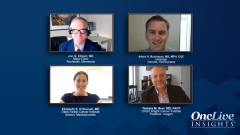
Expanding Cancer Screening: The Future of Blood-Based Testing
Closing out their panel, experts discuss the potential of blood-based tests to democratize access to cancer screening, complement existing protocols, and achieve early detection goals in the fight against cancer.
Episodes in this series

Transcript:
Elizabeth O’Donnell, MD: Well, thank you for those comments and thank you all for this rich and informative discussion. Before we wrap up, I’d like to get final thoughts from each of you. From my perspective, I think the thing that most excites me is this idea of the democratization of access. That through a blood test, we may be able to expand access to screening to a broader range of people for a broader range of cancers, and that these are blood based. And as Dr Ebbert said earlier, patients are used to having blood draws. This is something that’s demonstrated to be feasible in the clinical trials that we’ve discussed today. And finally, I think it’s really important, again, coming back to this idea of universal access, that these tests…be designed to be inclusive of the majority of demographics across our country…so that we can broaden the reach of cancer screening to everyone who is in need of it.
Jon O. Ebbert, MD: Closing thoughts for me would be that there are only 4 cancers with recommended screening protocols, which leaves the majority of cancers found when symptoms occur, which is often too late for intervention. And we need to detect cancers earlier, and a test like MCED [multicancer early detection] can complement existing cancer screening.
Tom Beer, MD, FACP: …The power of MCED tests really harnesses aggregate incidents, which means that we’re able to combine a number of cancers for the purpose of early detection with a single test, and that is likely the only way forward to meaningfully expand cancer early detection in average-risk populations. It is no accident that the most common cancers are the ones that we didn’t attack today and MCED offers us a way forward to include many more cancers into the screening paradigm. And the second thought I have is that as I contemplate the ambitious goals of the Moonshot Initiative, it is difficult to imagine that we will succeed at reducing cancer mortality by half in 25 years without major advances in early detection and early intervention.
Adam H. Buchanan, MS, MPH, CGC: And I would wrap up by noting that we’ve talked a lot about what types of data to collect on test performance and diagnostic resolution and so forth. But I think it’s also critical, if we’re going to achieve the goal of equitable distribution of this technology, to gather data on representativeness and how access is achieved across various underserved groups. So we need to understand not just how tests perform, but for whom and in what contexts. And use a variety of tools, for example, like those found in implementation science, to assess the how in addition to the what and the why. So I think we will need to have a multilevel approach to studying how MCED testing is evaluated. And that’s going to be key to understanding whether it works for all as intended.
I would like to thank, once again, everyone on the panel here for lending your expertise and your time. To our viewing audience, thank you for joining us. We hope you have found this OncLive Insights® program to be useful and valuable to the [treatment] of your patients. Thank you.
Transcript is AI generated and edited for readability.

































